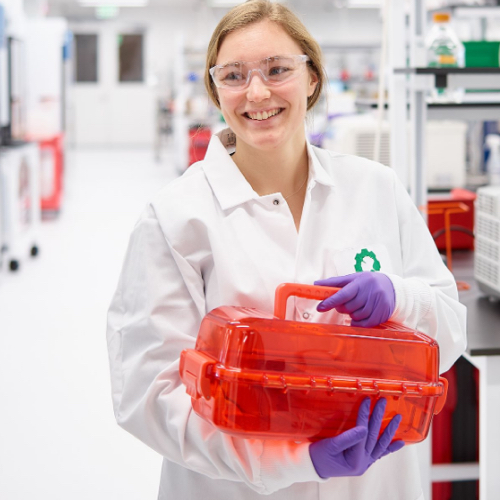As universities slowly begin to reopen, institutions face difficult decisions about when and how to bring students back to campus. But even in this uncharted territory, university leaders are coming up with clever solutions to protect students, staff, and the surrounding community. In partnership with the leading news outlet for colleges and universities, The Chronicle of Higher Education, we recently had the opportunity to hear from several senior administrators at universities from across the country about the COVID-19 strategies that have allowed students to return to in-person learning. This webinar featured leaders from Vassar College, Fayetteville State University, Kenyon College, University of Vermont, and University of South Carolina. Read on for the highlights and key lessons from the conversation, or watch the replay here.
Test promptly and frequently
Throughout the conversation, it was clear from all the panelists that providing COVID-19 testing services to students, faculty, and staff is key to successfully reopening and bringing students back on campus. Offering prompt testing to everyone who needs it is a critical part of ensuring that campuses can not only reopen, but stay open. These university leaders have deployed a mix of PCR-based testing and rapid antigen testing on their campuses, allowing them to catch individual cases – and support positive cases with quarantine and recovery measures – before they turn into full-blown outbreaks that would force the campus to close again.
While testing at a regular cadence is the core of most reopening strategies, that doesn’t mean that a single plan works for every community. By tailoring their approach to the unique needs of their own communities, university leaders are able to find what works best for them. Vassar College’s President Elizabeth Bradley recommended a paper titled, “Reopening Colleges During the Coronavirus Disease 2019 (COVID-19) Pandemic—One Size Does Not Fit All” to help determine the best path forward for your institution based on its individual characteristics, such as size and geographical location. With its robust testing program, Fayetteville State University was able to bring its case count down significantly, according to the school’s Director of Student Health, Vinette Gordon.
Interestingly, some campuses like Kenyon College and University of South Carolina have also leveraged wastewater testing as another form of assurance in their COVID-19 strategy. Testing wastewater for the SARS-CoV-2 virus provides valuable information on the health of the campus community and can help catch cases early on. For example, Kenyon College President, Sean Decatur says they noticed an elevated reading in their wastewater testing results—an early warning sign of a potential outbreak. They were able to step up testing efforts in response, allowing them to catch a new positive case that they might have otherwise missed without that early warning.
Partner and pool to lower the cost
Making testing accessible for every member of the campus community is a top concern for universities across the country. But scaling up testing to cover an entire community is no easy task. Many campuses are struggling with a lack of funding and resources to begin testing at the scale required to reopen and stay open.
The panelists discussed several ways they’ve been able to bring testing to their campuses despite budget constraints. Largely, partnerships with local health departments, neighboring universities, and state and federal bodies have been critical in securing the tests and financing required for large-scale, on-campus testing. The panelists were excited about the prospect of low-cost, rapid antigen tests becoming more widely available and their potential to bring down overhead as they look to the spring semester.
Another promising strategy that aims to bring down the cost of testing is pooling. Pooling allows you to collect samples from several people in a community and screen them with a single test—maximizing that test’s reach. By testing multiple people at once, you can save on the time and cost of running multiple, individual tests. And if a pooled test comes back positive, you know to send that specific cohort back for individual testing. Pooling has the potential to dramatically reduce the resources spent on testing and get results to more people, faster.
“Students must be partners in a school’s COVID-19 response plan in order for it to be effective.”
Collaborate with students and the community
Another theme that emerged throughout the discussion was the importance of collaboration on and off campus. The ultimate takeaway? Students must be partners in a school’s COVID-19 response plan in order for it to be effective.
University of South Carolina’s Executive Director of Student Health Services and the Healthy Carolina Wellness Program, Debbie Beck, recommended getting the student body government involved to make sure their voices are heard in developing the plan from day one. Vassar College professionally trained students from its EMS and paramedic departments to help with contact tracing. They also shared that, of course, you can never underestimate the power of swag with a college community. What these academic leaders have seen is that students want to be on campus and are willing to comply with testing and other safety measures, like distancing and masking, to return to their everyday lives – activating the student body plays an invaluable role in ensuring participation.
The panelists also emphasized the importance of engaging their stakeholders: adjacent communities, businesses, families, and individuals who regularly visit or otherwise interact with their campus. Communicating and working with the local community to ensure their concerns are heard and met is critical. In an effort to better collaborate with their local community in Burlington, University of Vermont President, Suresh V. Garimella says they developed a website where community members could voice their concerns. In an effort to help boost the local economy, Vassar College came up with creative ways for businesses to sell food and beverages on campus in a way that safeguards the health of both students and the broader community.
These five universities have been outstanding examples of how to effectively craft and implement on-campus COVID-19 testing programs, and for testing in the U.S. more broadly. Our testing service, Concentric by Ginkgo, is committed to providing a range of testing options designed to fit each community’s unique needs. If you’re interested in bringing PCR or antigen testing to your campus, contact us today at www.concentricbyginkgo.com.

